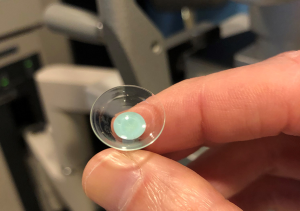
There are people in this world whose dry eye is so severe they cannot open their eyes from the pain. A similar fate afflicts those with severe scarring of the cornea or keratoconus — a condition that deforms the eye and destroys vision.
“They come into your office with two pairs of sunglasses and a visor hat, because bright lights cause extreme pain. It’s hard even to examine them, they are in so much pain,” says Wilmer optometrist Anisa Gire, OD. She, along with Michelle Hessen, OD, and Jeremy Goldman, OD, are experts in a surprisingly little-known device known as PROSE — prosthetic replacement of the ocular surface ecosystem. PROSE helps these patients when nothing else will. The devices are custom-fitted to a patient’s eyes and are made of a gas-permeable material and act like a protective, transparent shield over the damaged eye, floating on a thin layer of saline.
“For many of these people, glasses are not helpful,” says Goldman who specializes in “medically necessary” contact lenses such as PROSE. “These rigid, gas-permeable contact lenses focus light in a way that the patient’s own cornea can’t, because it has been misshapen or injured from surgery or disease.”
So, why aren’t devices like PROSE, and the lenses that Goldman prescribes, better known? Possibly because of their cost. PROSE runs just over $5,500 per eye. While some insurance plans will cover the cost of these devices, Medicare and Medicaid do not. Low-income and elderly people on fixed incomes who are most in need of these transformative products are often unable to afford them.

All three optometrists have developed fundraising approaches to purchase the products for those who cannot afford them. Goldman calls his program G-SLAM — the Goldman Specialty Lens Assistance Method. It’s a pay-it-forward model in which patients who can afford to make a gift are encouraged to do so, to help those less fortunate to afford the lenses.
Sharon Morris is one of those donors. She came to see Goldman after nearly two years in bed, trying to protect a delicate corneal transplant that left her unable to close her eyelids. She was unable to drive, unable to work, unable to do much of anything. Goldman prescribed scleral lenses for her. Since she began wearing the specialized lenses, she has gotten her life back: She can once again drive and work.
Morris became a donor and was eager to contribute to G-SLAM, and now her gifts are helping people afford specialized lenses that are not covered by their insurance plans. “Dr. Goldman is such a perfectionist in everything he does. More people should know about him,” Morris says. “It’s like giving people the miracle of sight.”
Learn more about the pay-it-forward program in the Wilmer Annual Report 2020.
Interested in supporting life-changing treatments at the Wilmer Eye Institute?
Topics: Friends of Johns Hopkins Medicine, School of Medicine, Wilmer Eye Institute, Promote and Protect Health